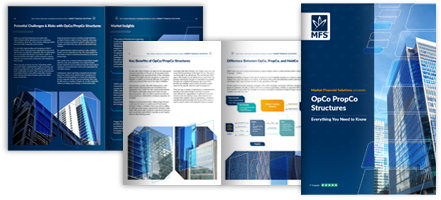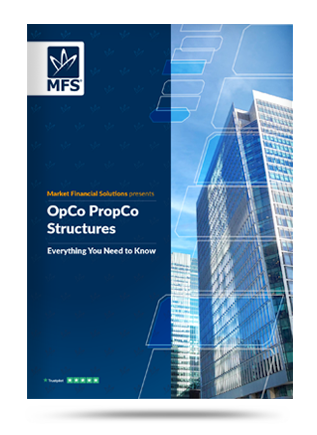Market Financial Solutions are a bridging loan and buy-to-let mortgage provider and are not legal, financial, investment or tax advisers. This document is for informational purposes only and does not, and should not be considered, to constitute legal, financial, investment or tax advice or be relied upon by any person to make a legal, financial, investment or tax decision. Therefore, Investors are encouraged to seek appropriate professional advice. The information in this content is correct at time of writing.

When people talk about property portfolio companies, they could be refering to one of a number of things or scenarios.
This can include certain investment vehicles that allow investors to indirectly invest in the property market. For example, Real Estate Investment Trusts (REITs) are publicly traded companies that own and manage property portfolios that external investors can invest in. The investors in-turn may receive income in the form of dividends. Similarly, there are real estate Exchange Traded Funds (ETFs)[1], and other kinds of pooled property funds[2].
Then there are development and/or service firms that can be considered property portfolio companies. These firms can provide services that help property investors get invested, and well known providers include RW Invest and CBRE[3].
But, for our corner of the property market specifically, property portfolio companies are most likely to concern the types of setups/corporate structures that property investors create to manage their assets.
Specifically, property investors will commonly utilise share purchase agreements (SPAs), limited liability partnerships (LLPs), or limited companies when expanding their portfolios. In this blog, we’ll break down these structures, all of which we can work with here at Market Financial Solutions.
Why limited companies are growing in popularity
Limited companies are proving to be especially important in the current market. Generally, property investors will utilise limited company ownership structures to try and cut their tax and admin costs. Whether this is the right move will very much depend on the underlying investors circumstances, but it’s evident that many believe it’s the way to go.
According to analysis from Pegasus Insight[4], limited company ownership is now a significant driver of BTL mortgage activity. Some 20% of landlords now own at least some of their properties through a limited company, while the average proportion of a limited company landlord’s portfolio held in this way has more than doubled from 36% in Q1 2020, to 74% in Q2 2025.
Tax benefits and trade-offs of limited company ownership
While a complicated concern that should be planned out with qualified tax advisors or accountants, tax bills can indeed be cut substantially with a limited company incorporation. This is primarily evident when we compare corporation tax and income tax rates. Currently, limited companies pay 19% in corporation tax on profits up to £50,000. This rises to 25% on profits above £250,000, with marginal relief available between these two thresholds.
With income tax, which is levied on individuals, 20% is paid by basic rate taxpayers. This rises to 40% for higher rate taxpayers, and 45% for those in the additional rate bracket[5].
Although, these tax savings need to be taken into consideration with the potential drawbacks of limited companies. Mortgage rates for limited companies may be higher in the market, and there may be fewer options out there among BTL lenders[6].
Still, there is no getting away from the fact that when people generally consider property portfolio companies, limited companies will likely be at the forefront of their minds. There are now well over 400,000 BTL limited companies in the UK, making them Britain’s largest business type[7].

Share purchase agreements
Share purchase agreements (SPAs) are contracts used to acquire property portfolio companies, and can in some cases shield investors from certain tax costs. Generally, an SPA is a document that sets out the terms of a sale of company shares, and the ownership structure. In laymen’s terms, an SPA allows an investor to buy the shares of a company that already owns properties.
So, instead of buying each property directly, the investor buys the company that holds them and once the shares change hands, the investor effectively controls the company, and the underlying properties.
This can be a complicated route to asset ownership however and again; property investors will need to weigh up the pros and cons involved. There may be tax and security benefits, but SPAs can evoke litigation issues where things go wrong. According to Chronical Law[8], there were at least 14 cases that made it onto Westlaw and so far in 2025, there are 9 and more claims are expected over the coming months.
Limited liability partnerships
With LLPs, two or more people set up the entity to invest in or manage property assets. Each member within this partnership will have their liability limited to what they put in and the profits made are filtered though to the individual members.
With this setup, there can be more flexibility in how tax costs, profits, and succession planning are managed. Property investors may chose to utilise LLPs over limited companies where they’re more concerned with flexibility and transparency over tax efficiencies.
Again, property investors will need to determine if this is the right way forward for their circumstances. LLPs come with their own benefits but in recent months, HMRC has warned UK landlords it will clamp down on property owners who use LLPs to evade tax by transferring properties[9].
With all property portfolio companies, borrowers need to ensure they’re on the right side of the rules. To make sure they don’t end up facing any harsh penalties, property investors and landlords should seek professional guidance.
Consolidation
Another important consideration for property investors is that not only can Market Financial Solutions work with various property portfolio companies, we can also help with consolidation efforts. Across our bridging, BTL, and fusion ranges, we can consolidate several loans onto one facility, helping those who need to streamline their plans.
In fact, we have recently launched a new ‘Fusion Premier’ range, which was designed specifically to allow large portfolios to be consolidated under a single loan at a lower annual rate.
These premier products are for residential properties only, and it has loan sizes ranging from £20 million to £65 million, though there is a maximum value for any individual property within a portfolio of £4 million.
Evidently, we are always looking for new ways to support investors and landlords with property portfolio companies, or other complicated circumstances. Where the market demands nuance, we will adjust.

The Complete Guide to
OpCo/PropCo Structures
Everything you need to know
- Fundamentals of OpCo/PropCo
- How does the structure work?
- Key benefits
- Risks and challenges
- Real-world applications
[1] https://www.justetf.com/uk/how-to/invest-in-real-estate.html
[2] https://www.rlam.com/uk/institutional-investors/our-capabilities/property/royal-london-property-fund/
[3] https://www.complete-ltd.com/top-8-uk-property-investment-companies/#:~:text=RW%20Invest,To%20learn%20more%2C%20click%20here.
[4] https://www.introducertoday.co.uk/breaking-news/2025/09/advisers-must-seize-opportunities-for-company-structure-landlords/
[5] https://greystoneaccountants.co.uk/blog/investing-in-property-through-a-limited-company-in-2025/
[6] https://www.kapitalre.co.uk/blog/invest-in-property-through-limited-company/
[7] https://www.telegraph.co.uk/money/property/buy-to-let/buy-to-lets-britain-biggest-business-landlords-offset-tax/
[8] https://chroniclelaw.co.uk/blogs/2025/07/23/share-purchase-agreements-getting-your-fair-share/
[9] https://www.accountancydaily.co/landlords-told-not-use-llp-tax-avoidance-scheme




